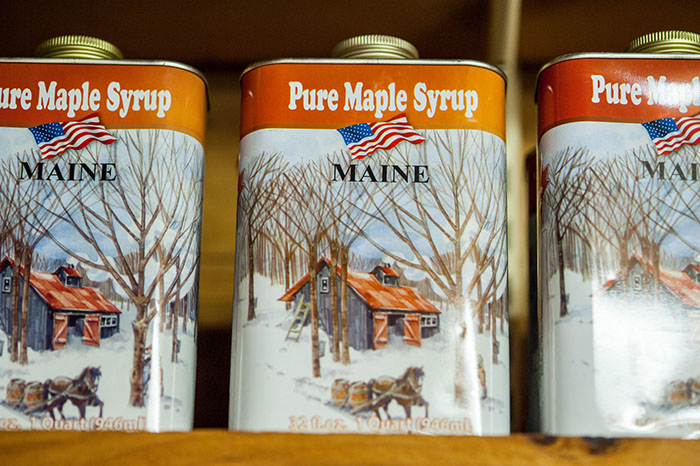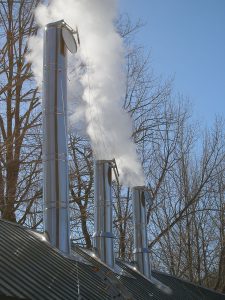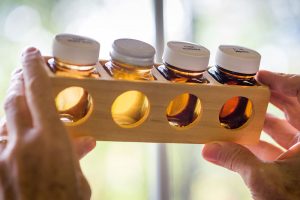Bulletin #7041, Licensing and Regulations for Maple Syrup Processing in Maine
By Kathryn Hopkins, Extension educator, University of Maine Cooperative Extension
For information about UMaine Extension programs and resources, visit extension.umaine.edu.
Find more of our publications and books at extension.umaine.edu/publications/.
Table of Contents
- Premises
- Plant Construction and Design
- Equipment and Utensils
- Sanitary Facilities and Controls
- Labeling
- Personnel
- Licensing
- Official Standards for Maple Syrup Grades
- Resource List
- References
 Harvesters in Maine produce about 17% of the country’s maple syrup — nearly 550,000 gallons. The annual value of maple syrup production in Maine is nearly $18 million. Think you might like to get in on the action? There are some things you need to know first.
Harvesters in Maine produce about 17% of the country’s maple syrup — nearly 550,000 gallons. The annual value of maple syrup production in Maine is nearly $18 million. Think you might like to get in on the action? There are some things you need to know first.
If you are interested in getting a license to sell maple syrup, you will need to fill out an application and mail it to the Maine Department of Agriculture, Conservation and Forestry. To get an application call the department at 207.287.3841 or go to the Maine Department of Agriculture, Conservation and Forestry Quality Assurance & Regulations Application Forms web page to print out an application.
All food businesses use the same license application. You only need to fill out the portions that concern your maple business. You may need multiple licenses. A maple syrup processor license is required for making and selling syrup from your sugarhouse and allows you to wholesale product to others. A mobile food vendor license is required to retail your syrup from anywhere other than your place of business, such as at a farmers market. If you produce value-added products from your syrup, you will need a home food processor license if you work in a home kitchen, or a commercial processor license if you have a separate commercial kitchen. Department of Agriculture personnel will inspect your sugarhouse and/or kitchen and be looking for the following at your facility(ies):
1. Premises
- The grounds outside the maple syrup plant shall be reasonably clean and free of unnecessary clutter or equipment that could harbor rodents.
- Sewage and wastewater shall be disposed of in an approved septic system or other approved wastewater disposal system consistent with Maine’s Subsurface Wastewater Disposal Rule. If you have specific questions about a disposal system, start by asking your town’s code enforcement officer or plumbing inspector.
2. Plant Construction and Design
-

The plant must have a roof to protect the evaporator from the elements and condensation.
- The evaporator fire shall be vented to prevent smoke and ashes from contaminating the syrup.
- The plant shall be equipped with sufficient light so that thermometers, hydrometers, refractometers, and other equipment are easy to read.
3. Equipment and Utensils
- Equipment and utensils shall be adequate for their intended use.
- Equipment shall be designed to prevent food contamination and shall be made of durable, non-porous and easily cleanable material. Evaporator pans, buckets, tanks, and other food processing equipment shall not be made with solder containing lead in any quantity.
- Light bulbs, fixtures, or other glass suspended over exposed food, food areas used in any step of preparation, and in storage areas for food packaging containers shall be shatter-proof, shielded, or otherwise protected to prevent food contamination in case of breakage.
- Equipment shall be kept in a clean, sanitary condition at all times and sufficiently free from rust so as not to pose a risk of product contamination.
- Only new containers shall be used for bottling the finished product. Caps shall be tamper-evident.
4. Sanitary Facilities and Controls
- The water supply shall be ample for all operations and shall be obtained from a potable public or private supply. Private water supplies shall be tested yearly. Small operations that bottle syrup only, directly from the evaporator, and use hot water drawn from the evaporator for equipment sanitizing are exempt from water testing.
- All utensils and product contact surfaces of equipment used in the plant shall be cleaned prior to use and following any interruption during which utensils and contact surfaces may have become contaminated.
- Hand-washing facilities shall be located in or conveniently available near the processing area.
- Toilet facilities shall be provided to comply with U.S. Department of Labor standards in 29 CFR, section 1910.141. A maple processor is exempted from the requirements of this section if the processing plant is operated by the owner and immediate family members only and uses no outside employees, provided a toilet is available for immediate family in a family household conveniently located near the processing facility.
- Sale of maple syrup and maple products made from permanent structures located at agricultural fairs on fairgrounds may, with prior approval from the Department, use temporary hand-washing and temporary ware-washing facilities to comply with sanitary requirements and practices to ensure that safe food products are sold. Equipment used at these facilities that requires disassembly for cleaning and sanitizing shall be disassembled at the end of each day and cleaned and sanitized, using a previously approved method, before the start of the next day’s activities. These temporary activities shall be limited to a period of not more than 2 weeks per year.
- Maple syrup shall be bottled hot at a temperature not less than 185°F.
- The pipeline tube shall be cleaned with an approved food-grade sanitizer solution and rinsed prior to use and following any interruption during which the tube may have become contaminated.
5. Labeling
- Each container shall bear:
- The name of the product.
- Contents by volume.
- Name and address (including zip code) of manufacturer or distributor.
- The grade of the product, as determined in accordance with 01-001 Code of Maine Regulations, chapter 117 (Official Standards for Maple Syrup Grades).
6. Personnel
- No person suffering from any communicable or contagious disease shall be employed in or about an establishment where maple syrup is manufactured.
- Personnel shall wear clean outer garments when working in the processing areas.
- No tobacco shall be used in any form in the plant.
7. Licensing
- Application and Fee. Application for approval for Maple Syrup Processing Plants shall be filed annually with the Department of Agriculture, Conservation and Forestry. Applications shall be accompanied by the appropriate fee as enumerated in Chapter 330, License Fees to Manufacture and Sell Food & Beverages.
- Additional License for Off-Premises Sales. The license for a maple syrup processing plant allows the license holder to sell maple syrup retail from the maple processing property and to distribute wholesale without additional license. Retailing products beyond the processing property requires the seller to obtain a mobile food vendor license from the Department to sell packaged products, except for packaged products offered for retail sale in a permanent structure at an agricultural fair that holds a valid license as described in (C) below.
- Maple Product Sales at Agricultural Fairs. Permanent structures erected on fairgrounds shall be licensed by the Department of Agriculture, Conservation and Forestry for the retail sale of maple syrup and products. All portable vending carts, trailers, or vehicles engaged in maple product food service sales shall be licensed by the Department of Health and Human Services, Health Inspection Program.
- Inspection and Issuance. Before a license is issued or renewed, the Department shall inspect the premises of the applicant.The commissioner shall, within 30 days following receipt of application, issue a license to operate any maple syrup processing plant that is found to comply with 22 M.R.S.A., Chapter 551, Subchapter I and the provisions of this chapter. When any such applicant, upon inspection by the commissioner, is found not to meet such requirements, the commissioner is authorized to issue either (i) a temporary license for a specified period not to exceed 90 days, during which time corrections specified by the commissioner shall be made by the applicant for compliance, or (ii) a conditional license setting forth conditions which shall be met by the applicant to the satisfaction of the commissioner.
As you can see, becoming a state-licensed processor and vendor of maple syrup and maple syrup products takes some commitment. If you’re ready to dive in, you can learn more with the University of Maine Cooperative Extension publications in the Resource List below.
Official Standards for Maple Syrup Grades
 “Maple syrup,” which may also be spelled “maple sirop” or “maple sirup,” means the liquid derived by concentration and heat treatment of the sap of maple (Acer species) trees, or by the solution in water of maple sugar or maple concentrate made from such sap. The solids content of maple syrup may not be less than 66% by weight or more than 68.9% by weight, as measured in Brix units at a temperature of 68°F.
“Maple syrup,” which may also be spelled “maple sirop” or “maple sirup,” means the liquid derived by concentration and heat treatment of the sap of maple (Acer species) trees, or by the solution in water of maple sugar or maple concentrate made from such sap. The solids content of maple syrup may not be less than 66% by weight or more than 68.9% by weight, as measured in Brix units at a temperature of 68°F.
“Grade A Golden Color Delicate Taste” means pure maple syrup that is free of any material other than pure, clear liquid maple syrup in sanitary condition; has a color for light transmittance of not less than 75%Tc; has a delicate taste; and has a light to more pronounced golden color. Grade A Golden Color Delicate Taste maple syrup must be free of sugar crystals and may not be damaged in any way.
“Grade A Amber Color Rich Taste” means pure maple syrup that is free of any material other than pure, clear liquid maple syrup in sanitary condition; has a color for light transmittance of less than 75%Tc but not less than 50%Tc; has a rich or full-bodied taste; and has a light amber color. Grade A Amber Color Rich Taste maple syrup must be free of sugar crystals and may not be damaged in any way.
“Grade A Dark Color Robust Taste” means pure maple syrup that is free of any material other than pure, clear liquid maple syrup in sanitary condition; has a color for light transmittance of less than 50%Tc but not less than 25%Tc; has a more robust or stronger taste than maple syrup in lighter color classes; and has a dark color. Grade A Dark Color Rich Taste maple syrup must be free of sugar crystals and may not be damaged in any way.
“Grade A Very Dark Color Strong Taste” means pure maple syrup that is free of any material other than pure, clear liquid maple syrup in sanitary condition; has a color for light transmittance of less than 25%Tc; has a very strong taste; and has a very dark color. Grade A Very Dark Color Rich Taste maple syrup must be free of sugar crystals and may not be damaged in any way.
“Processing Grade” means any maple syrup that does not qualify for Grade A labeling, including off-flavored maple syrup and syrup with objectionable odors, turbidity, or sediment. Processing Grade maple syrup may not be sold in retail markets and must be packed in 5-gallon or larger containers.
Quoted from 126th Maine Legislature, LD 658, HP 450.
Resource List
- Natural Resources — Maple Syrup Production: A collection of links to publications, spreadsheets, and videos covering how-to basics, budgeting, and safety.
- Maple Syrup Quality Control Manual
- Recipe to Market: How to Start a Specialty Food Business in Maine
- Handbook for Maple Grading and Judging Training
References
National Agricultural Statistics Service, U.S. Department of Agriculture. 2014. News release: Maple syrup production. Northeastern Regional Field Office, Harrisburg, PA. June 11. www.nass.usda.gov/Statistics_by_State/New_England_includes/Publications/0605mpl.pdf
Prepared by Kathryn Hopkins, University of Maine Cooperative Extension, from Code of Maine Regulations, Chapters 117 and 347 and Maine Revised Statute 892.
Reviewed by Steve Giguere, Program Manager, Maine Dept. of Agriculture, Conservation and Forestry, Division of Quality Assurance and Regulations, January 2015
This work is supported by the USDA National Institute of Food and Agriculture, RREA project 228285.
Information in this publication is provided purely for educational purposes. No responsibility is assumed for any problems associated with the use of products or services mentioned. No endorsement of products or companies is intended, nor is criticism of unnamed products or companies implied.
© 2014, 2020
Call 800.287.0274 (in Maine), or 207.581.3188, for information on publications and program offerings from University of Maine Cooperative Extension, or visit extension.umaine.edu.
The University of Maine is an EEO/AA employer, and does not discriminate on the grounds of race, color, religion, sex, sexual orientation, transgender status, gender expression, national origin, citizenship status, age, disability, genetic information or veteran’s status in employment, education, and all other programs and activities. The following person has been designated to handle inquiries regarding non-discrimination policies: Sarah E. Harebo, Director of Equal Opportunity, 101 North Stevens Hall, University of Maine, Orono, ME 04469-5754, 207.581.1226, TTY 711 (Maine Relay System).

